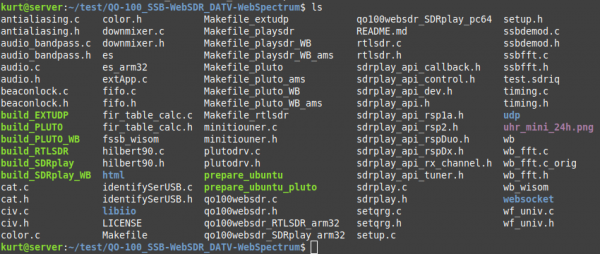User Tools
Sidebar
Table of Contents
QO-100 Web SDR for Linux
Installation
DOWNLOAD
You start any Linux computer (tested are Raspberry-PI, Odroid, Orange-PI as well as desktop computers with Debian compatible OS like: Ubuntu, Mint…). The WebSDR should run on almost all Debian compatible OSs. On non-Debian OSs (Opensuse, Fedora…) it usually runs as well, but the install scripts may have to be adapted, because libraries may have different names.
Then open a terminal and enter the following commands:
git clone https://github.com/dj0abr/QO-100_SSB-WebSDR_DATV-WebSpectrum cd QO-100_SSB-WebSDR_DATV-WebSpectrum
the complete WebSDR is now on the hard disk which can be displayed with this command:
ls
Preparingthecomputer
First, various libraries need to be installed. There are two utilities that do this work:
- prepare_ubuntu (if you work with the RTL-SDR stick or the SDRplay).
- prepare_ubuntu_pluto (if you work with the Adalm Pluto)
so you start one of these two programs:
./prepare_ubuntu or ./prepare_ubuntu_pluto
additional software is now installed, which is done quickly.
SDRplay
For the SDRplay you have to install the driver from the SDRplay website. The driver can be found here https://www.sdrplay.com/downloads/
Choose the right driver for your hardware, download it (API) and install it. Then proceed as described here.
Creating the WebSDRs
ready-made programs are also available for this purpose, which create a WebSDR that fits the SDR receiver used. Available are:
RTL-SDR Stick (and compatible) … for receiving the narrow band SSB transponder
Pluto or SDRplay … for receiving the Narrow-Band SSB transponder as well as for the Wide-Band DATV transponder
due to the limited bandwidth the RTL stick is not suitable for the DATV transponder. However, it works very well for SSB.
according to the used SDR receiver one enters the following commands:
to create the WebSDR for the SSB transponder.
./build_RTLSDR or ./build_PLUTO or ./build_SDRplay
to build the WebSDR for the DATV transponder.
./build_PLUTO_WB or ./build_SDRplay_WB
after a few seconds the WebSDR is ready, the finished program has the name “qo100websdr”.


